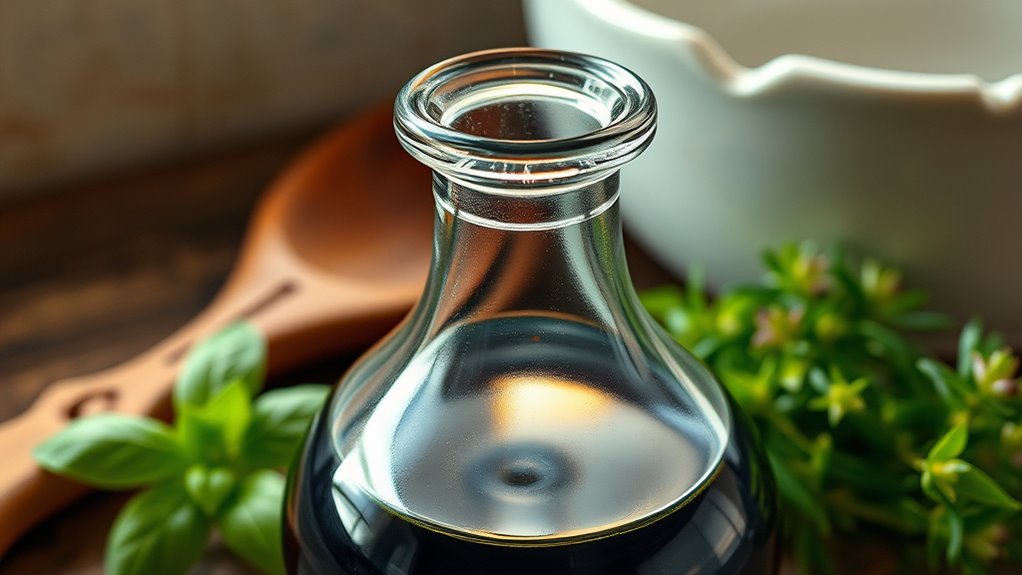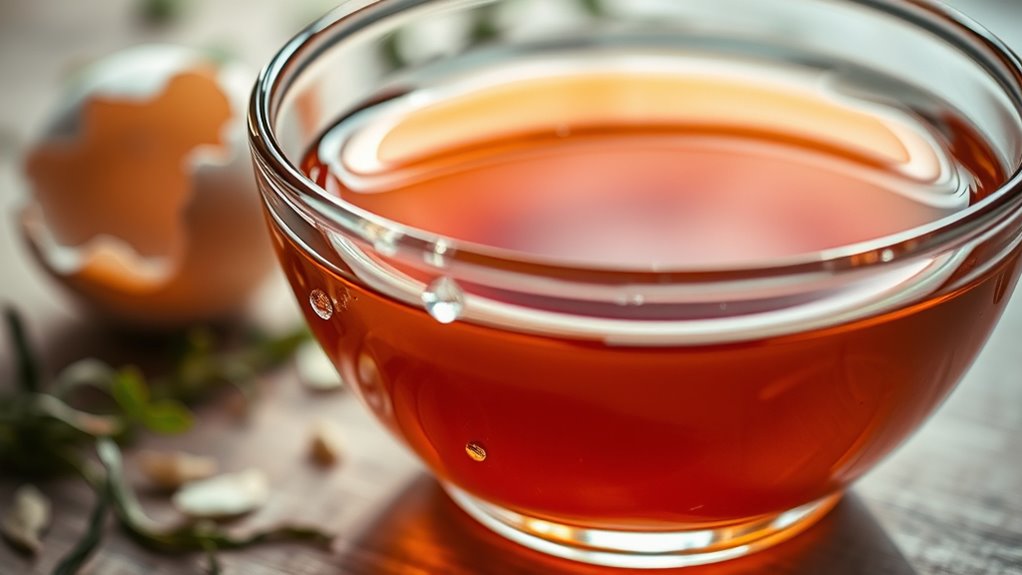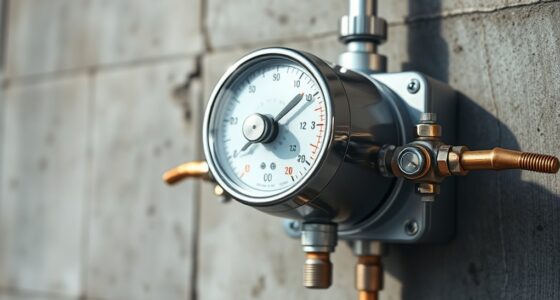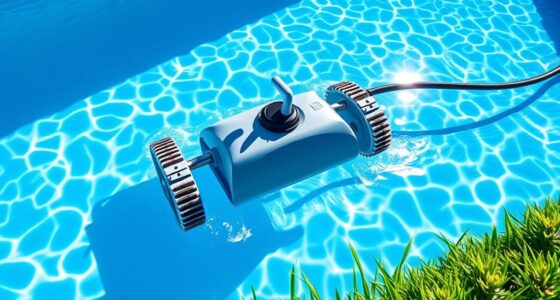Vinegar shines in cooking, adding brightness to marinades, dressings, and pickles, while also acting as a natural preservative. It’s great for tenderizing meat and enhancing flavors without overpowering. In cleaning, vinegar tackles grime, mineral buildup, and odors effectively, all eco-friendly. However, it falls short for delicate flavors—risking over-weakening dishes—or sanitation needs, as it’s not a reliable sterilizer. To discover more about vinegar’s strengths and limitations, keep exploring its versatile uses.
Key Takeaways
- Vinegar excels as a natural preservative, flavor enhancer, and tenderizer in cooking but can overpower delicate dishes.
- It is highly effective for cleaning glass, countertops, and mineral deposits, offering an eco-friendly alternative to harsh chemicals.
- Vinegar’s acidity can cause damage to natural stone surfaces like marble and granite, requiring cautious use.
- It is not a reliable disinfectant against all bacteria and viruses, especially for high-germ areas needing strict sterilization.
- Use vinegar carefully around sensitive materials such as rubber seals and certain plastics to prevent deterioration.

Vinegar is a versatile kitchen staple that can elevate your cooking and cleaning routines, but it’s not a miracle solution for every problem. You might reach for it to add tang to salads or to help clean your kitchen surfaces, but understanding its limitations keeps you from relying on it inappropriately. While vinegar excels in some areas, there are occasions when it simply isn’t effective, or worse, could cause problems if misused.
In cooking, vinegar shines when you want to add acidity and brightness to dishes. It’s perfect for marinades, salad dressings, pickling vegetables, and even tenderizing meat. Its tangy flavor enhances flavors without overpowering them, and because it’s a natural preservative, it extends the shelf life of homemade condiments. When you’re making coleslaw or adding a splash to soups, vinegar’s acidity balances richness and cuts through greasiness. It’s also invaluable in baking, especially in recipes like quick breads or certain cakes, where its acidity reacts with baking soda to produce leavening. This makes vinegar a handy ingredient that can replace chemical leaveners in many recipes.
However, vinegar isn’t suitable for all dishes. It can sometimes overpower delicate flavors, so you should use it judiciously. If your recipe calls for subtlety, a heavy-handed pour might ruin the dish. Additionally, certain ingredients—like dairy or eggs—may curdle or break down if exposed to too much acidity. If you’re adding vinegar to a dairy-based sauce, proceed with caution to avoid unwanted texture changes.
On the cleaning front, vinegar is often touted as a natural solution for removing stains, deodorizing, and disinfecting surfaces. It works well on glass, countertops, and even in the laundry to remove odors. Its acidic nature helps break down mineral deposits, soap scum, and grime effectively. You can use it to descale your coffee maker or clean your windows without harsh chemicals. However, vinegar isn’t a universal disinfectant. It’s not effective against all bacteria and viruses, especially when compared to commercial disinfectants. You shouldn’t rely solely on vinegar for sanitizing surfaces that require rigorous sterilization, like cutting boards used for raw meat or bathroom fixtures where germs are prolific.
Furthermore, vinegar can damage certain materials. It can erode natural stone surfaces like marble or granite and may weaken rubber seals or certain plastics over time. If you’re unsure, test a small area first or stick to cleaning methods recommended by manufacturers. While vinegar can be a powerful and eco-friendly cleaning agent, it’s important to recognize its limitations and avoid using it as a one-size-fits-all solution. Knowing where it shines and where it fails helps you make smarter choices in the kitchen and around the house.
Frequently Asked Questions
Is All Vinegar Suitable for Cleaning Purposes?
Not all vinegar is suitable for cleaning purposes. You should stick to white distilled vinegar or apple cider vinegar, as they have high acidity and no added sugars or dyes that can stain or damage surfaces. Avoid flavored or balsamic vinegars for cleaning, since their additives can cause issues. Always dilute vinegar with water before using it on surfaces, and test a small area first to prevent any damage.
Can Vinegar Improve My Garden’s Soil Health?
Using vinegar can improve your garden’s soil health, especially to control weeds or adjust pH levels temporarily. For example, if your soil is too alkaline, a diluted vinegar solution may help lower the pH slightly. However, avoid overusing vinegar, as it can harm beneficial microbes and damage plants. Always test your soil first, and use vinegar sparingly for best results.
Are There Health Risks Associated With Consuming Large Amounts of Vinegar?
Yes, consuming large amounts of vinegar can pose health risks. You might experience stomach upset, acid reflux, or tooth enamel erosion if you drink it excessively. It can also lower potassium levels and interact with certain medications. So, it’s best to enjoy vinegar in moderation. Always dilute it properly and consult your healthcare provider if you have concerns or underlying health conditions to avoid potential adverse effects.
How Long Does Homemade Vinegar Last Before Spoiling?
If you make homemade vinegar, it typically lasts up to a year if stored in a sealed jar in a cool, dark place. For example, you notice a cloudy film forming after several months, which is normal. As long as it smells and tastes right, it’s safe to use. However, if you see mold or a foul odor, discard it to avoid health risks.
Can Vinegar Be Used to Treat Skin Conditions?
Yes, you can use vinegar to treat minor skin conditions, but do so with caution. Dilute it with water to avoid irritation, and test it on a small patch first. Apple cider vinegar is popular for soothing acne or insect bites, thanks to its antibacterial properties. However, avoid using vinegar on open wounds or severe skin issues, and consult a healthcare professional for persistent or serious concerns.
Conclusion
So, next time you reach for vinegar, remember it’s a double-edged sword—brightening dishes or masking flaws. Like a fiery sun, it can illuminate your flavors or scorch your efforts if used unwisely. Trust your senses, and don’t let its sharpness cloud your judgment. When wielded thoughtfully, vinegar becomes a shining gem in your kitchen arsenal; mishandled, it’s just another shadow lurking in the background. Choose wisely, and let your culinary light shine.









